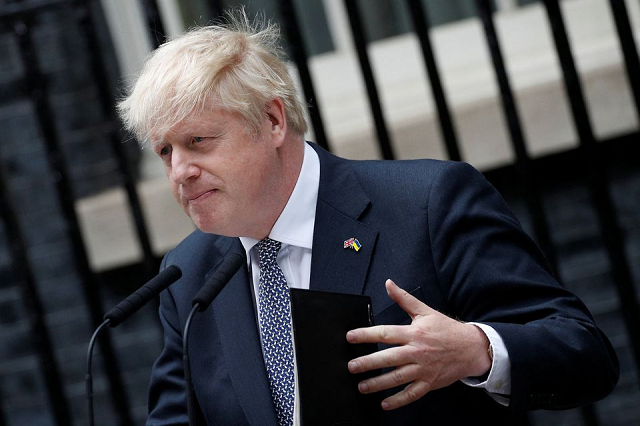
Scandal-ridden Boris Johnson announced on Thursday he would quit as British prime minister after he dramatically lost the support of his ministers and most Conservative lawmakers, but said he would stay on until his successor was chosen.
Bowing to the inevitable as more than 50 ministers quit and lawmakers said he must go, an isolated and powerless Johnson said it was clear his party wanted someone else in charge.
"Today I have appointed a cabinet to serve, as I will, until a new leader is in place," Johnson said outside his Downing Street office where his speech was watched by close allies and his wife Carrie.
After more than 50 ministers resigned and lawmakers voted that he must leave, Boris Johnson decided to resign from his position as British prime minister on Thursday.#etribune #news #BorisJohnson #UK pic.twitter.com/GxVgFOCpd9
— The Express Tribune (@etribune) July 7, 2022
"I know that there will be many people who are relieved and perhaps quite a few who will also be disappointed. And I want you to know how sad I am to be giving up the best job in the world. But them's the breaks."
Johnson gave no apology for the events leading to his announcement and said his forced departure was "eccentric".
There were cheers and applause as he began his speech, while boos rang out from some outside the gates of Downing Street.
After days of battling for his job, Johnson had been deserted by all but a handful of his closest allies after the latest in a series of scandals broke their willingness to support him.
The Conservatives will now have to elect a new leader, a process which could take weeks or months, with details to be announced next week.
A snap YouGov poll found that defence minister Ben Wallace was the favourite among Conservative Party members to replace Johnson, followed by junior trade minister Penny Mordaunt and former finance minister Rishi Sunak.
While Johnson said he would stay on, opponents and many in his own party said he should leave immediately and hand over to his deputy, Dominic Raab.
Keir Starmer, leader of the main opposition Labour Party, said he would call a parliamentary confidence vote if the Conservatives did not remove Johnson at once.
"We can't go on with this prime minister clinging on for months and months to come," he said.
The crisis comes as Britons are facing the tightest squeeze on their finances in decades, in the wake of the Covid-19 pandemic, with soaring inflation, and the economy forecast to be the weakest among major nations in 2023 apart from Russia.
It also follows years of internal division sparked by the narrow 2016 vote to leave the European Union, and threats to the make-up of the United Kingdom itself with demands for another Scottish independence referendum, the second in a decade.
Support for Johnson had evaporated during one of the most turbulent 24 hours in recent British political history, epitomised by finance minister, Nadhim Zahawi, who was only appointed to his post on Tuesday, calling on his boss to resign.
Zahawi and other cabinet ministers went to Downing Street on Wednesday evening, along with a senior representative of those lawmakers not in government, to tell Johnson the game was up.
Initially, Johnson refused to go and seemed set to dig in, sacking Michael Gove - a member of his top ministerial team who was one of the first to tell him he needed to resign - in a bid to reassert his authority.
But by Thursday morning as a slew of resignations poured in, it became clear his position was untenable.
"You must do the right thing and go now," Zahawi tweeted.
Some of those that remained in post, including Wallace, said they were only doing so because they had an obligation to keep the country safe.
There had been so many ministerial resignations that the government had been facing paralysis. Despite his impending departure, Johnson began appointing ministers to vacant posts.
"It is our duty now to make sure the people of this country have a functioning government," Michael Ellis, a minister in the Cabinet Office department which oversees the running of government, told parliament.
From popular to deserted
The ebullient Johnson came to power nearly three years ago, promising to deliver Brexit and rescue it from the bitter wrangling that followed the 2016 referendum. He shrugged off concerns from some that his narcissism, failure to deal with details, and a reputation for deceit meant he was unsuitable.
Since then, some Conservatives had enthusiastically backed the former journalist and London mayor while others, despite reservations, supported him because he was able to appeal to parts of the electorate that usually rejected their party.
That was borne out in the December 2019 election. But his administration's combative and often chaotic approach to governing and a series of scandals exhausted the goodwill of many of his lawmakers while opinion polls show he is no longer popular with the public at large.
The recent crisis erupted after lawmaker Chris Pincher, who held a government role involved in pastoral care, was forced to quit over accusations he groped men in a private member's club.
Johnson had to apologise after it emerged that he was briefed that Pincher had been the subject of previous sexual misconduct complaints before he appointed him. The prime minister said he had forgotten.
This followed months of scandals and missteps, including a damning report into boozy parties at his Downing Street residence and office that broke Covid-19 lockdown rules and saw him fined by police over a gathering for his 56th birthday.
There have also been policy U-turns, an ill-fated defence of a lawmaker who broke lobbying rules, and criticism that he has not done enough to tackle inflation, with many Britons struggling to cope with rising fuel and food prices.
In his resignation speech, Johnson highlighted his successes - from completing Brexit to ensuring the fastest Covid-19 vaccine rollout in Europe. But he said his attempts to persuade colleagues that changing leader while there was war in Ukraine and the government was delivering on its agenda had failed.
"I regret not to have been successful in those arguments. And of course, it's painful not to be able to see through so many ideas and projects myself," he said.
"But as we've seen at Westminster the herd instinct is powerful - when the herd moves, it moves and, my friends, in politics no one is remotely indispensable."
1732071267-0/lana-(2)1732071267-0-405x300.webp)
1727242355-0/Diddy-(1)1727242355-0-165x106.webp)

1732063440-0/elon-(3)1732063440-0-165x106.webp)













COMMENTS (2)
Comments are moderated and generally will be posted if they are on-topic and not abusive.
For more information, please see our Comments FAQ